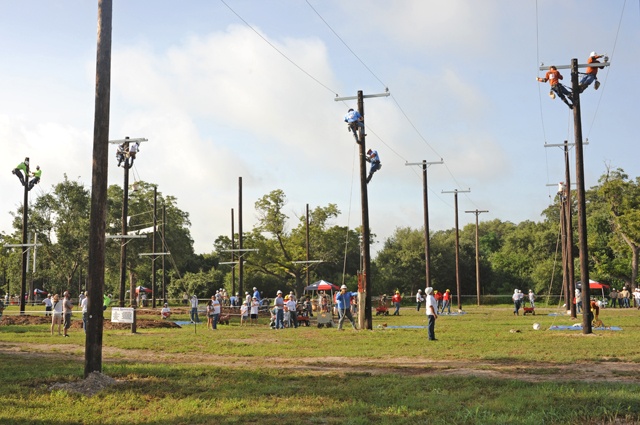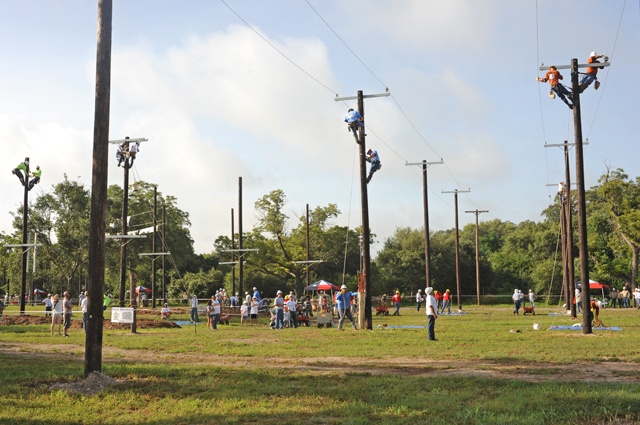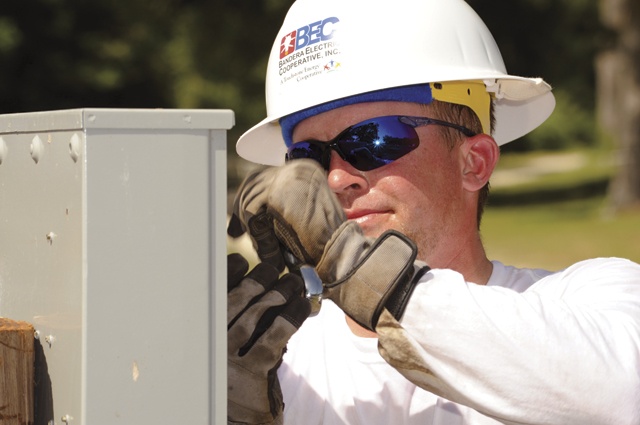Danny Williams was 22 years old in January 1965 when he landed a job in Brady at what was then called McCulloch Electric Cooperative.
He began as a groundman—a grunt—and started climbing the career ladder, setting poles and running wire on a construction crew, climbing poles as a journeyman lineman, and earning supervisory roles as a line superintendent and outside operations manager.
Williams learned as he worked, but not from safety instructors or textbooks. His teachers were the electric linemen around him, the grizzled veterans who knew firsthand the life-threatening risks of the job: falls, electrical burns, electrocution. It was an old-fashioned schooling for the Brady native whose 21-year stay with the electric co-op led him to career heights beyond his dreams.
Almost half a century later, as the 67-year-old Williams looks back, it’s clear that much has changed: McCulloch is now known as the Brady Division of Sharyland Utilities, which acquired the co-op in 1999. And Williams, as manager of lineman safety and training programs for Texas Electric Cooperatives (TEC), sees what a difference formal education is making for the state’s crop of electrical linemen.
Today’s linemen—and apprentices working hard to become linemen—have a much better handle on the complexities of an increasingly high-tech industry that demands a broad skill set. Whether it’s practicing overhead line construction, grasping the intricacies of single- and three-phase transformers, or learning to communicate better and stay safe at work via job briefings, linemen are getting an open-book and hands-on training experience.
Williams says with similar education and training available in 1965, he would have been much better prepared for his lineman career. Now, as manager of TEC’s Loss Control Department, he’s helping mold the futures of young, and older, linemen who have that same determined gleam in their eyes.
“It’s so satisfying to teach somebody,” Williams say. “You see the lights come on. There’s no better feeling in the world.”
TEC’s Loss Control curriculum represents the interests of 64 electric co-ops and 33 municipalities and contractors. As a key component of the overall program, Loss Control specialists teach lineman schools at electric co-ops around the state, using state-of-the-art training fields and equipment.
Loss Control also coordinates the National Rural Electric Cooperative Association’s Rural Electric Safety Achievement program and provides Occupational Safety and Health Administration, or OSHA, general industry training.
TEC gives lineman hopefuls a head start through the four-year Electric Distribution Lineman Apprenticeship Training Program that’s certified by the U.S. Department of Labor.
TEC is not alone in its quest to give apprentices a well-rounded education as they embark on their careers—or, for older linemen attending classes, the training they never received 20 or 30 years ago. While TEC does not have exclusive partnerships with any college, it does advise 10 schools on what to include in lineman training curriculum.
Most prominently, TEC facilitates certificate degree programs and associate degree plans at South Plains College in Levelland and Western Texas College in Snyder.
Many TEC members (electric co-ops only) and nonmembers (municipalities and contractors) enroll students in Loss Control’s training program, so a typical start might look like this: Get hired by one of those organizations, some of which also conduct their own training, and begin formal training with TEC.
Some Texas electric co-ops are requiring applicants to receive lineman training at the college level. But whether lineman candidates train solely through Loss Control’s curriculum or mix in college education with on-the-job training, the goal remains the same: Get certified as a journeyman lineman, generally a four-to-six-year process. (Texas does not license electric linemen; certification is done by the electric co-op or utility under the jurisdiction of the U.S. Department of Labor.)
Most TEC members use the 8,000-hour apprentice program developed by the Department of Labor as a guide, says Tiffin Wortham, vice president of Member Services for TEC.
The training path differs around the state. Guadalupe Valley Electric Cooperative (GVEC), for example, typically hires individuals with no electrical line-work experience and starts training them on-site while also enrolling them in the TEC Loss Control program and South Plains College’s associate degree program. Over the past year, the co-op hired two individuals who received electrical lineman training certificates from South Plains College.
After four years of intense training, GVEC apprentices are eligible to test and become a lineman. Extensive training, says Bobby Christmas, the co-op’s engineering and operations manager, makes apprentices smarter, wiser and safer linemen.
“If you choose not to take the classes, work safely and maintain a positive, can-do attitude,” Christmas says of the training, “then you choose not to work here. We want to make sure our line crews are properly trained, work safely and are willing to provide the membership of GVEC the absolute best customer service possible.”
——————–
Camille Wheeler, associate editor



